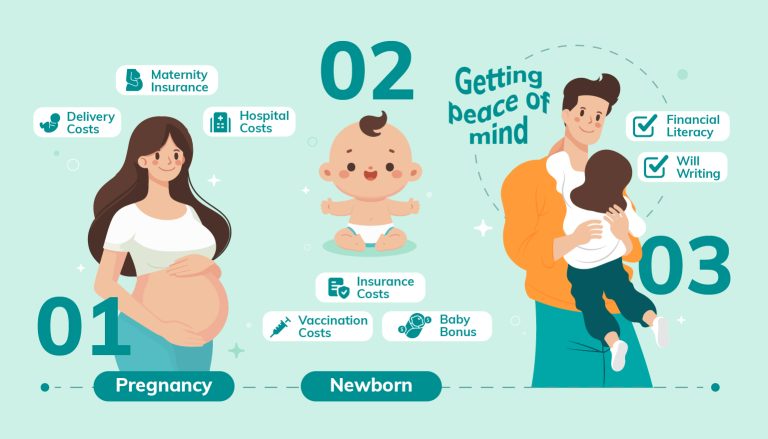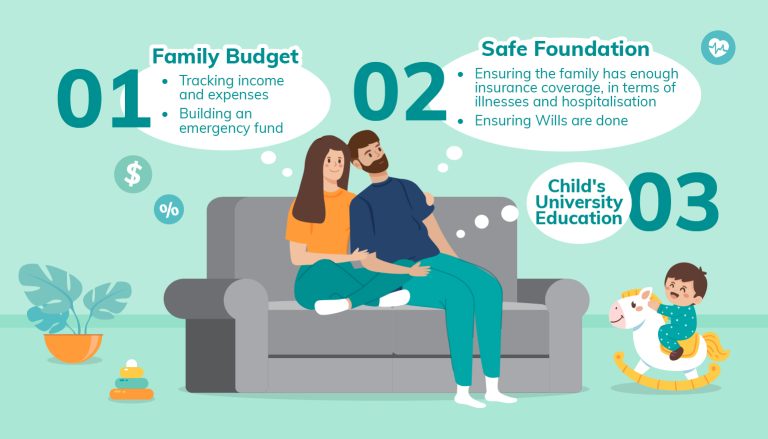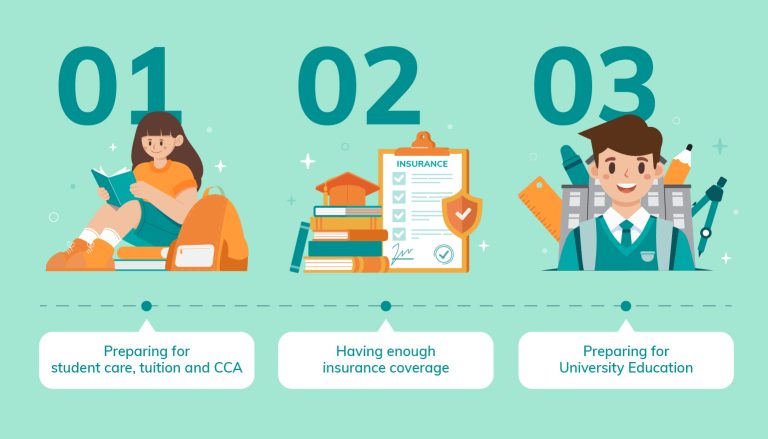Navigate Parenthood with Confidence
Comprehensive checklists to help you prepare for every stage from newborns to students covering education, tuition, medical insurance, and more, so you can focus on what matters most.
Comprehensive checklists to help you prepare for every stage from newborns to students covering education, tuition, medical insurance, and more, so you can focus on what matters most.
Which stage is your child at now?
Select the stage that best fits your child’s current age to access customised checklists and guidance.
Planning to have a child or expecting a newborn
Childcare to kindergarten
Primary to secondary school
Explore the personalised checklist to help you navigate this chapter of your life with ease.

10 minutes
The cash gift can be used for any purpose, as it is credited as Cash to the Child’s Savings Account (CSA).
$5,000 (no initial deposit required from parents)
Up to $4,000.
Funds in the CDA can only be used for approved purposes such as healthcare, preschool fees, and other educational needs.
A Guide for First-Time Parents
Here are common options parents consider when having a newborn baby, along with their associated costs:
Cost: Ranges from $2,800 to $4,000/mth
If sourced through agency, it may cost up to $4,500/mth
Salary: $500 to $750/mth depending on experience and nationality
Domestic helper Levy: $60/mth (concession)
Medical insurance: $700 to $1,000 a year, depending on age and tier of insurance.
If sourced through an agency, there will be additional charges such as fees and paperwork administrative charges that can amount to $2,000 to $3,000.
Government-approved centres:
Typically cost $700/mth after government subsidies
(Can be paid using CDA account)
Private Infant Care:
Typically $2,000 to $3,000 after government subsidies
Read article for more – other alternatives and options
As first-time parents, the costs of baby essentials can feel overwhelming, often adding up to $3,000 to $4,000. However, you can save by exploring the second-hand market for hand-me-downs, where many items are available at lower prices.
With careful budgeting and planning, you can manage these expenses more effectively.
To help you get started, we’ve curated a checklist that outlines the essential items you’ll need for your baby, along with average prices to guide your budgeting process.
30 minutes
Surprising Facts – Which Insurance Plans to Get First for a Newborn
Fully subsidised for Singaporean newborns
In Singapore, vaccinations for newborns under the National Childhood Immunisation Schedule (NCIS) are fully subsidised for citizens, ensuring that families do not incur any out-of-pocket costs when accessing these essential services at clinics or through home-based options.
Additionally, parents have the option to purchase extra vaccines that are not covered under the NCIS, allowing them to provide additional protection for their children if they choose to.
Vaccinations can be done at Polyclinics or GPs.
Skip the queue and get the convenience by booking home-based vaccination service with telehealth providers.
In event of your untimely demise, if you have a newborn and do not write a will, the distribution of your assets will be determined by Singapore’s intestacy laws. This means that your estate may not be distributed according to your wishes, which can lead to potential disputes among family members.
Additionally, without a designated guardian in place, the court will decide who will care for your child, which may not align with your preferences.
Writing a will ensures that your wishes are clearly stated and provides protection for your loved ones.
Craft your Will using MoneyOwl’s Digital Will-Writing service
Craft your Will using MoneyOwl’s Digital Will-Writing service
This e-book demonstrates how to optimise government grants, the types of insurance needed for adequate protection, how to grow your money so you can plan for your child’s education (and your retirement) as well as how to plan for all those big what-if scenarios.

10 minutes
With busy schedules and limited options, parents often struggle to find ways to care for their children. One of the many options is to enroll your child in infant or childcare.
Subsidy applications are submitted to ECDA through licensed childcare centres. Please visit their website for more details.
Start investing a small amount each month for your child.
By the end of 15 years, you would have accumulated roughly $41,000 based on a Growth portfolio’s return of 6.25%*. This amount can be used for their studies or as a gift for them.
*Disclaimer: This is for illustrative purposes only, based on historical return of a low-cost, passive global indexed growth portfolio comprising 80% stocks and 20% bonds. Past returns are no guarantee of future returns. A Growth portfolio may or may not be suitable for you, as it depends on your time horizon and risk appetite.
30 minutes
Being able to track and see where your expenses go is like having control over the steering wheel of your financial journey.
Click here to read our OwlRubrics: Implementing Personal Budget.
Fully Subsidised for Singaporean Children
In Singapore, vaccinations for newborns under the National Childhood Immunisation Schedule (NCIS) are fully subsidised for citizens, ensuring that families do not incur any out-of-pocket costs when accessing these essential services at clinics or through home-based options.
Additionally, parents have the option to purchase extra vaccines that are not covered under the NCIS, allowing them to provide additional protection for their children if they choose to.
Vaccinations can be done at Polyclinics or GPs.
Skip the queue and get the convenience by booking home-based vaccination service with telehealth providers.
In event of your untimely demise, if you have a child and have not written a will, the distribution of your assets will be determined by Singapore’s intestacy laws. This means that your estate may not be distributed according to your wishes, which can lead to potential disputes among family members.
Additionally, without a designated guardian in place, the court will decide who will care for your child, which may not align with your preferences.
Writing a will ensures that your wishes are clearly stated and provides protection for your loved ones.
Craft your Will using MoneyOwl’s Digital Will-Writing service
This e-book demonstrates how to optimise government grants, the types of insurance needed for adequate protection, how to grow your money so you can plan for your child’s education (and your retirement) as well as how to plan for all those big what-if scenarios.

10 minutes
The recommended approach to preparing for your child’s university education is to start investing as early as possible. By doing so, you can take advantage of time and compound growth to build up a substantial education fund.
However, not all parents may have enough set aside by the time their child is ready for university.
Fortunately, there are various government schemes and support programs that can help ease the financial burden of paying for tuition fees:
Click below to read the article for more details.
Costs of sending your child for student care, tuition and other activities
Enrolling children in enrichment classes has become the norm, with many parents willingly investing in these programs to provide their kids with additional learning opportunities and structured supervision after-school hours.
The following are the common after-school activities and their respective costs.
30 minutes
Teaching your child good money habits can set them up for financial success later in life. Here are some simple ways to start:
By introducing these habits early, you can set your child on the path to a healthy financial future
In event of your untimely demise, if you have a newborn and do not write a will, the distribution of your assets will be determined by Singapore’s intestacy laws.
This means that your estate may not be distributed according to your wishes, which can lead to potential disputes among family members.
Additionally, without a designated guardian in place, the court will decide who will care for your child, which may not align with your preferences.
Writing a will ensures that your wishes are clearly stated and provides protection for your loved ones.
Craft your Will using MoneyOwl’s Digital Will-Writing service
This e-book demonstrates how to optimise government grants, the types of insurance needed for adequate protection, how to grow your money so you can plan for your child’s education (and your retirement) as well as how to plan for all those big what-if scenarios.



Sign up for our Owlhoots newsletter and never miss out on the latest financial news and updates!